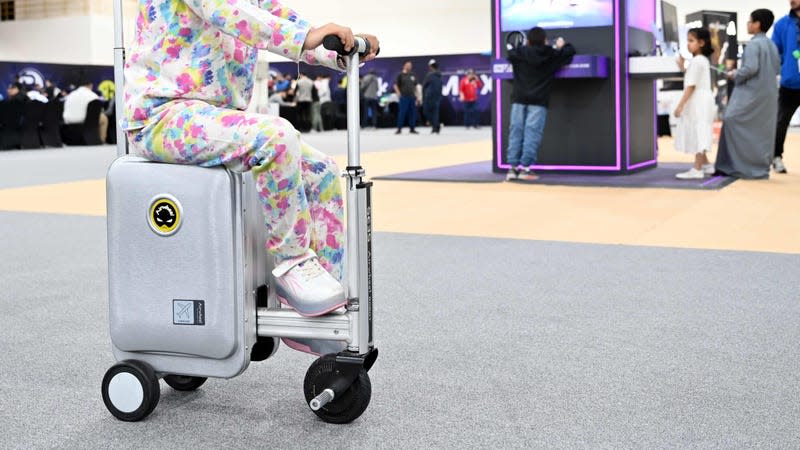Japan Requires Electric Suitcase Riders To Have A Driver’s License And Wear A Helmet
Photo: Asad/Xinhua (Getty Images)
As Japan continues to position itself as a leader in technological advancement, the new wave of motorized luggage has sparked a regulatory response that highlights the complexities of urban mobility. Electric suitcases, which function as luggage while doubling as motorized scooters, have become increasingly popular among both tourists and locals. However, this innovation has brought with it a host of legal challenges and safety concerns, prompting the Japanese government to step in with stringent regulations.
The Rise of Electric Suitcases
Electric suitcases have surged in popularity, particularly among travelers who appreciate the convenience of a luggage-borne scooter. These gadgets allow users to glide effortlessly through crowded airports and city streets, evoking an image of futuristic ease and mobility. The appeal is undeniable, especially in a post-pandemic world where the resurgence of tourism has led to more people exploring Japan than ever before. According to reports, the first half of 2023 saw over one million more visitors compared to the same period in 2019, significantly influencing urban dynamics.
Yet, this new trend has also caught the eye of Japanese authorities. Motorized suitcases fall under the category of motorized bicycles, similar to mopeds, due to their operational mode. This classification comes with specific legal obligations that many tourists may be unaware of.
Stricter Regulations for Safety
The laws governing the use of electric suitcases in Japan are decidedly strict. According to the Guardian, riding one of these machines mandates possession of a valid driver’s license and the use of a helmet. For most tourists, these requirements may seem burdensome and impractical. It’s likely that a typical visitor to Japan may not possess an international driver’s permit or be willing to don a helmet while navigating the confines of an airport terminal or urban sidewalks.
Kansai International Airport in Osaka has taken proactive measures by advising travelers against riding motorized suitcases on its premises. Despite the notice, enforcement has not been lenient. A notable incident occurred in late March when a Chinese student found herself facing legal repercussions for riding her electric suitcase on an Osaka sidewalk. This instance has raised questions about how rigorously these regulations will be enforced moving forward.
Historical Context and Future Considerations
Japan has a history of adapting its laws to keep pace with technological advancements. Just this year, the government lifted restrictions on electric scooters, allowing them more freedom of movement within urban spaces. However, this adjustment has not come without complications; reports indicated a staggering 400-percent increase in traffic violations among e-scooter riders, illustrating that regulatory changes can lead to unintended consequences.
The case of electric suitcases further complicates these dynamics. While advocates for innovation argue that these vehicles enhance convenience and the traveler experience, critics emphasize the need for appropriate safety measures to prevent accidents and ensure responsible use. As the popularity of self-propelled luggage continues to grow, authorities will need to weigh the benefits of modernization against public safety concerns.
Conclusion: Navigating the Future
As Japan finds itself at a crossroads between innovation and regulation, the evolution of electric suitcases serves as a case study for how emerging technologies challenge existing legal frameworks. The necessity for a driver’s license and helmet may discourage casual use among tourists, potentially stunting the growth of this intriguing trend. Moreover, how Japan chooses to enforce these regulations could set a precedent for other countries grappling with similar challenges posed by new forms of transportation.
In an era where convenience often reigns supreme, the question remains: Can Japan balance the dual imperatives of innovation and safety as it navigates this uncharted territory? The continued enforcement of laws surrounding electric suitcases will not only shape the future of urban travel in Japan but may also influence global trends in technological regulation.
As tourists prepare to visit Japan, they must remain informed about these emerging laws to avoid legal repercussions and ensure a safe journey through the Land of the Rising Sun. For now, travelers should just tread carefully, suitcase in tow, and perhaps consider leaving the motorized aspect behind when venturing through the vibrant streets of Tokyo or Osaka.
